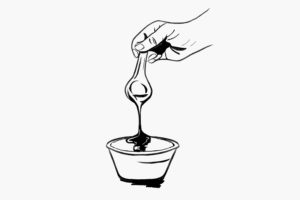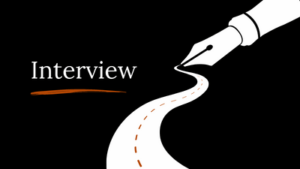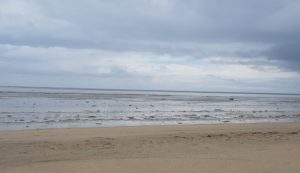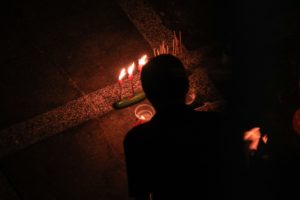INTERVIEWER
You served 6 years in the US Marine Corps and currently run a book group for veterans like yourself. Can you tell us about this work and what it means to you?
CODY
I’ve been doing book groups since 2019, but during the pandemic and with social distancing, everything went to Zoom. This actually gave me an opportunity to switch gears and host five-week writing workshops for veterans called “In Your Own Words”.
In the 244 years that America has been a country, 225 of those years have been spent at war or actively participating in global conflicts. And for all that fighting, we still have precious few non-fiction accounts of what comes after. In other words, everyone wants to talk about the violence, glory, and courage of combat, but no one wants to talk about the traumatic, confusing and vulnerable transition back into civilian life.
My workshops focus on creating space to telling these stories. I’ve had participants from the Korean War era, all the way to now, and for some this group is the first time they’ve let things off their chest in 30-40 years. Things held in because of the taboos of getting help or that talking about your troubles is an omission of being unable to handle your issues, and that mindset is killing people. In fact just last week, another member of unit let his inner demons get the best of him. That’s the second one since 2020 began. All because they felt they couldn’t talk to anyone about what was eating them up inside.
Though it is small, my work with these groups means everything to me because it is the one thing I can do to reach people where their at and let them know talking about hardship isn’t weakness. Story-telling is therapy, and that the best way through the worst of it, is together.
INTERVIEWER
You mention that story-telling is therapy for you and other veterans in your group. Is that why you started writing, to deal with trauma, or did you write before the injury you describe in The Thing in the Mirror?
CODY
When I started writing post-military, it was to avoid trauma and look for some escapism. The first writing class I took was a fiction writing class at my local university with the intent of writing anything but my own trauma. My writing professor, Diane Benedict, was the one who began to point out all the recurring themes of anxiety, fear, and confusion within my work, and she was the one who sat me down and asked the question, “What are you running from?” It seemed no matter how hard I tried to stuff my trauma away. It refused to stay quiet.
I ended up taking a memoir class with her the next semester and used it to explore all of these pent-up emotions that were eating away at me. As I kept writing, I found that writing the truth was giving me a sense of empowerment. The more vulnerable I became, the more I felt others began to understand me, and in turn, I began to understand myself. The first draft of The Thing in the Mirror had been drafted during that first memoirs class. Back to the point, I began to realize that what I was doing was more than just taking writing classes. I had stumbled onto a method of healing that had been truly transformative, and I one I could learn to teach others how to do. It was then I realized that what I really wanted to do with my life was share this method of healing and teach veterans how to learn to tell their own stories. After I graduated from University, I decided to go after my Master’s in Creative Writing so I could understand the craft better and get the credentials to make that dream a reality.
INTERVIEWER
It’s interesting how the practice of writing led you, despite intending to do it for escapist reasons, towards confronting your demons. It seems as if your unconscious is at work when you write, unearthing things your conscious mind preferred to keep hidden. What role do you think the unconscious has in writing and other art forms, like music?
CODY
That’s a pretty deep question and I think one, we as writers should explore. I think the unconscious is a powerful tool for creating art because it holds the unrestricted truth of ourselves. This purity in truth persists regardless of whether or not we can face or even being to conceive it and in that transition of trying to understand we end creating beautiful and terrifying things.
INTERVIEWER
Moving from the unconscious to the conscious mind, I wonder if you have any specific influences or models in mind when you write. Which authors have inspired you and your work?
CODY
I have to say that the authors who have really influenced how I think about writing and my work are Tobias Wolff, Jo Ann Beard, Mark Z. Danielewski, and Neil Gaiman. Collectively it is how these authors tell stories is what I aspire too. Whether its fiction or non-fiction, these authors have a way of making their work feel personal to me as a reader. As if I’m sitting across the table at a bar, enthralled by some amazing tale. This is the level of story telling I want to achieve in my career.
INTERVIEWER
It’s been nine months since we published The Thing in the Mirror. My last question is, what have you been working on since and is there anything readers should look out for from you?
CODY
Since the publication of The Thing in the Mirror, I’ve been working towards finishing my memoir Stranger in My Own Skin, which is a continuation of that journey towards self love and reclamation of purpose. Other non-fiction work I’m proud of is a story about my family’s hidden racial history in Malaga Island. Wrestling with this whole past which was hidden from us until my Great-Grandmother passed away in 2007. We discovered a whole secret drawer with folders and journals of her mother detailing a whole biracial history, no on knew about.
The whole experience of memoir writing is both cathartic and emotionally draining, so I’ve also been dipping into the fiction world with some horror stories. Some have already been published through Ghost Orchid Press, Love Letters to Poe, and The Dread Machine. I’ve discovered that I really enjoy writing these spooky tales so be on the he look out for more of those.
Cody was interviewed by Mathis Clément, an editor at Moxy. Click here to read Cody’s piece The Thing in the Mirror.









